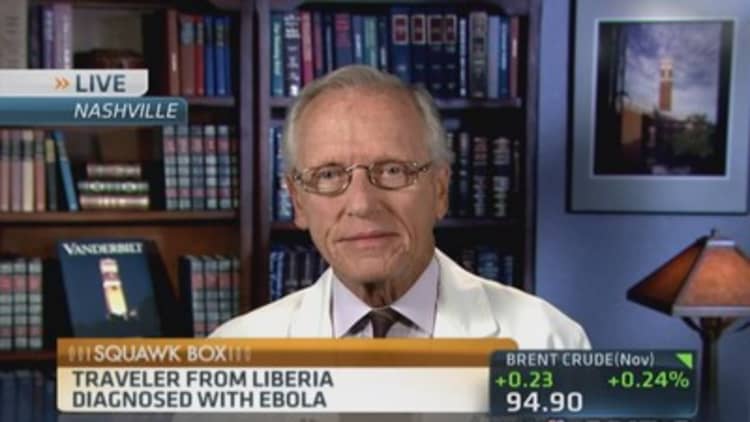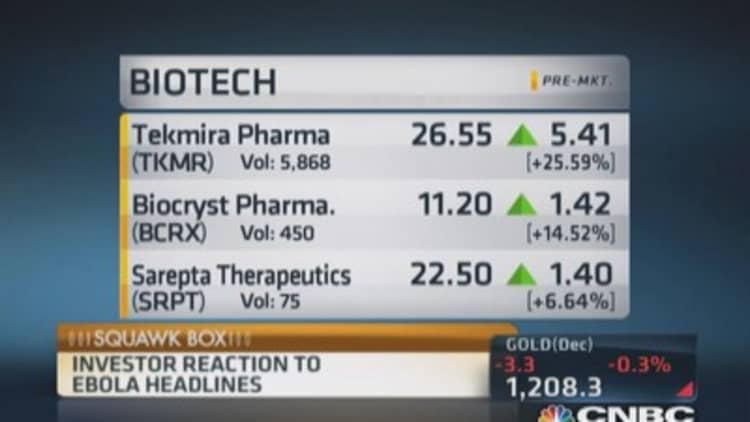While Ebola is tearing apart families, overwhelming cities, and compelling governments to isolate many of their citizens in several West African countries, the U.S. is not at risk of seeing similar circumstances from the disease, public health officials said.
The Centers for Disease Control and Prevention on Tuesday confirmed the country's first case of Ebola in the U.S., and the organization's director said that everyone who could have contracted the disease was being identified. Still, experts say the United States has a variety of tools to control Ebola, starting first and foremost at hospitals.
"We're very prepared: Infection-control people in hospitals over the past two months have been reviewing all their infection- control procedures because we anticipated just this sort of thing happening—a person coming from West Africa, they were healthy at the time they traveled, but got sick here," Dr. William Shaffner, an infectious disease specialist at Vanderbilt University Medical Center, told CNBC's "Squawk Box."
Still, hospital preparation cannot control an infection that occurred before the patient came in for treatment.
Read More First case of Ebola confirmed in the United States: CDC
"There may be a small outbreak because he did walk around with symptoms," said Debra Spicehandler, an infectious disease specialist at Northern Westchester Hospital in Mount Kisco, New York. "So we may see a few more cases related to him."
Spicehandler said authorities would only begin to worry about a difficult-to-contain outbreak if they found that the original patient had infected someone who then traveled to a second state.

But even then, she said, the U.S. would still have a handle on the outbreak, as "people are aggressively looking for this," and the disease makes someone so sick that they would be unlikely to avoid medical care.
The major tool in the public health arsenal for controlling an outbreak is contact tracing, experts said. This involves interviewing those with infections to ascertain with whom they have had close interactions, and then monitoring those people for 21 days. For a disease like Ebola, Spicehandler said, this process is relatively easy given that it cannot be transmitted just from proximity. The CDC has a helpful infographic on contact tracing here.
Read More Shares of companies testing Ebola vaccines rise
The number of people that the CDC and local officials will consider significantly at risk of having contracted the disease is relatively small, as it would require bodily fluid contact during the few days that the patient was symptomatic and not yet hospitalized, said JoEllen Harris, director of the Johns Hopkins Health System's Epidemiology and Infection Prevention Program.
This would include, for example, someone who had drawn blood from the man without wearing protective gloves, she said.
"Sneezing doesn't count, this is not a respiratory infection," Shaffner explained.

"The CDC really has a nice algorithm of what they consider contact with the patient," Harris said. "If the person was just febrile, but not having the diarrhea and vomiting, the potential for infection is much lower."
Dallas County Health and Human Services said it is monitoring 12 to 18 people, including family members and medical staff, identified as having had risky contact with the patient.
Read More What we know about the Texas Ebola patient
Health officials would only look beyond the interview process for possible infections if they had reason to believe that the patient had released fluids in a public location, and then they may utilize more advanced tools to identify those who may have been exposed, experts said.
This, however, appears not to have been the case. CDC Director Dr. Tom Frieden said that officials have "identified all the people who could have had contact with the patient while he was infectious." A representative from the CDC was not immediately available for comment on what tools would have been employed to track down possible infections.

But even if public health officials had not successfully identified those individuals, the country would still be "nowhere near" having to dissuade people from public spaces—particularly given the nature of how the disease is spread, Spicehandler said.
Technically, the government has the legal authority to apprehend those believed to be "a probable source of infection" and establish quarantine zones, but those interviewed by CNBC emphasized that no one is seriously talking about these options for Ebola.
Read MoreCDC: Working to identify anyone who had contact with sick patient
As for the patient's family members and health workers who are currently being monitored, public health experts said the disease would likely prove less deadly in American hospitals than it has been overseas.
"The supportive care that we're able to provide in the United States is so much better, so much more sophisticated, than what's available in West Africa. ... So we can move that needle of survival way down," Shaffner said. "Even Doctors Without Borders in West Africa are moving the fatality rate from 50 percent down to 30 percent—I bet we can do substantially better than that here."


